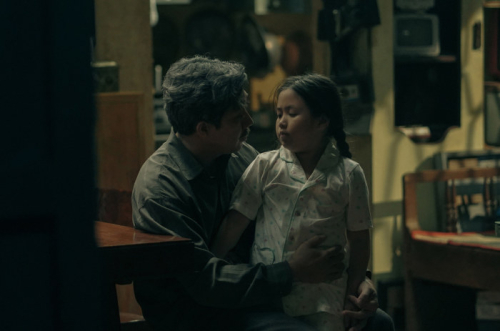
3388 Films
MOVIE REVIEW
Bo Gia (Dad, I’m Sorry) (2021)
In Vietnam’s all-time box office champ, “Bo Gia (Dad, I’m Sorry),” a deeply traditional extended family reckons with the generation gap and broader cultural shifts brought by modernization and Westernization. It’s the same well Ang Lee drew from exactly three decades ago to much international acclaim, yet this time it feels different. Whereas Mr. Lee became increasingly mindful of his international profile and audience as the “Father Knows Best” trilogy progressed, directors Tran Thanh and Vu Ngoc Dang are unabashedly Vietnamese in their approach, warts and all.
The impressive opening visually sets up the cultural clash: Diep The Vinh’s flashy blockbuster camerawork whizzes at different speeds, following bicycles and mopeds as they glide past various obstacles in narrow Saigon alleys that are virtually untouched by time. Along the way, we’re introduced to the tightknit clan at the film’s center. Our narrator, Ba Sang (co-director Tran Thanh, made up to look 20 years older), is a doormat who allows siblings to take advantage of him. His sister and employer, Hai Giau (singer NSND Ngoc Giau), lives right across the street. Their henpecked brother Tu Phu (Hoang Meo) is constantly around, while the ne’er-do-well brother Ut Quy (La Thanh) always needs bailing out.
Ba Sang’s eldest child, Quan (Tuan Tran), finds Internet fame and fortune as a Youtuber à la “Mainstream” – and as Biggie Smalls wisely put it, “Mo Money Mo Problems.” Oblivious of poverty chic, Ba Sang cleans up Quan’s $900 Gucci “dirty” sneakers and mends Quan’s $1,000 Dsquared2 ripped jeans – which the son describes as the massacre of his loved ones. Soon, family members begin scheming for a share of Quan’s newfound wealth. Hai Giau, who’s been angling to acquire Ba Sang’s house, dispatches her realtor son, Binh Loi (Quoc Khanh), to sell Quan a luxury apartment.
The film’s swift tone shifts are masterful. During a heated argument in which Quan attempts to persuade Ba Sang to move to the luxury high-rise for a better environment to raise his youngest, Bu Tot (Ngan Chi), a fight promptly breaks out in the foreground in front of their old house as a sight gag. While Ba Sang professes his love for seamstress Cam Le (Le Giang), telling her he hesitates to get her involved in the mess that is his family, the mood suddenly changes from romance to comedy as she angrily declares that she would have shielded him from his siblings’ bullying.
Few other films in the last three decades explicitly depict Asian cultures, from family values to male pride, with such specificity. For most Asians, boomers are the last generation to abide by such familial obligations. Indeed, tradition hasn’t been something newer generations of Asians – filmmakers included – necessarily hold dear or care to dwell on. Many Asian Americans especially treat Asian patriarchy with open disdain, even if they don’t object to white patriarchy. Ba Sang’s determination to solve others’ problems and pay others’ debts baffles Quan, yet taking care of business is the old-fashion way for Asian men to express love. Despite some of its over-the-top machinations, the film imparts a rare and meaningful message of reciprocating parents’ love while there’s still time.
Comments